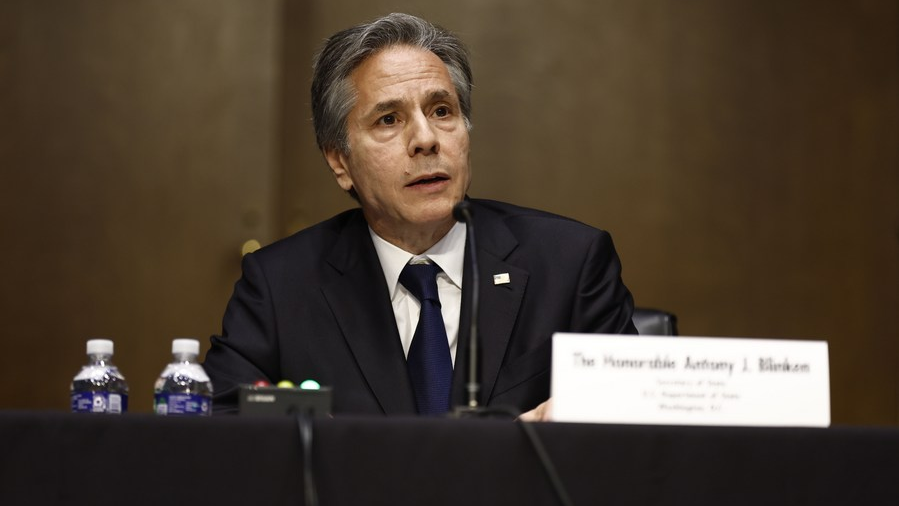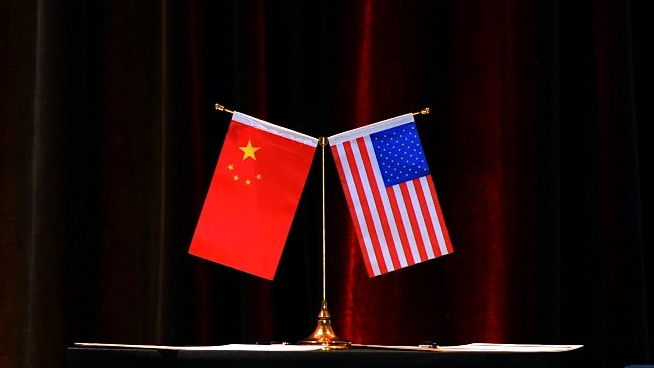
U.S. Secretary of State Antony Blinken testifies before the U.S. Senate Foreign Relations Committee on Capitol Hill in Washington D.C., U.S., April 26, 2022. /Xinhua
U.S. Secretary of State Antony Blinken testifies before the U.S. Senate Foreign Relations Committee on Capitol Hill in Washington D.C., U.S., April 26, 2022. /Xinhua
Editor's note: William Jones is a former White House correspondent for Executive Intelligence Review and a non-resident fellow of the Chongyang Institute for Financial Studies, Renmin University of China. The article reflects the author's opinions, and not necessarily those of CGTN.
The upcoming visit of U.S. Secretary of State Antony Blinken to Beijing will be the first for him as secretary of state and it is hoped that this visit, a direct result of the commitments made by U.S. President Joe Biden in his meeting with Chinese President Xi Jinping in Bali in last November, will include elements that can help further stabilize what has been a very rocky relationship recently between these two major countries.
Expectations are not high with regard to this visit making any major breakthrough in the relationship. While the Xi-Biden Bali meeting helped clear the air with regard to U.S. intentions, the continued moves by the U.S. to create a military alliance in the Asia Pacific, and the recent military "upgrading" of Japan's role in the region, indicate that the U.S. is primarily interested in reasserting its hegemony, that is, its ability to "set the rules" for the world community, including in the Asia Pacific region. The ongoing effort by the U.S. to use the conflict in Ukraine as a means to "whittle down" the political influence of Russia, even at the risk of provoking a nuclear conflict, has been extremely unsettling for many countries in Asia, including China, and others in Africa and Latin America.
Secretary Blinken is enough of a diplomat not to come to the Chinese capital simply to convey "ultimatums" to his counterpart, but will hopefully also be there to listen to China's concerns as well as to convey U.S. "concerns" about China. There will be no let up in U.S. attempts to building alliances, which are effectively, if not formally, aimed against China. But it is to be hoped that he will have something to offer to help alleviate some of the tensions on the economic front, in spite of the ongoing efforts to deprive China of its import of high-technology products from the U.S. in an effort to slow down China's technological development, and pressuring its "allies" to do the same.

The national flags of China and the U.S. /Xinhua
The national flags of China and the U.S. /Xinhua
Given the overall direction of U.S. policy, which continues to view China as a "rival," indeed, as its most important "rival," there are nevertheless things that can be accomplished from the visit which might serve to bring down the tensions. Some of the restrictions on travel by Chinese scholars and scientists to the United States could be lifted. While there is no flagging in the U.S. determination to remain the "rules giver," one could make some progress on the people-to-people front. It was clear from the numerous visits of the then-Ambassador Qin Gang, to many places in the United States during his year and a half here, that there was exhibited a great deal of support for a better U.S.-China relationship among the general population. What prevails in the Beltway in Washington does not necessarily prevail in the American heartland.
During Foreign Minister Qin's visits as China's ambassador to the U.S., it was clear that farmers, businessmen, students, artists and athletes exhibited a great deal of good will toward China. Given the media bias in the U.S., the reality of China is rarely reported to the general public. When people here know what China is actually doing, they are generally supportive. If this source of good will could be "tapped" more effectively through increased exchanges, it might over time help to change the mood in the Beltway.
Yet the fundamental dilemma remains. The world over the last couple of decades has seen the increased role of China on the global stage bring positive results for people throughout the world. China's Belt and Road Initiative (BRI), in particular, has met with enthusiastic responses from every corner of the world, including from the United Nations. It has effectively placed the issue of a Global Development Initiative on center stage for the first time in decades. While the U.S. continues to offer the world more war and bloodshed, China is offering high-speed rail and increased connectivity, and the majority of the world's population can see this dichotomy quite clearly, given the languid support, outside of the NATO countries, for continued arms to Ukraine, and clear support to China's initiatives such as the BRI. Hopeful the "sleepwalkers" in Washington will wake up to this fact. But until they do U.S.-China relations will remain on a somewhat rocky road.
(If you want to contribute and have specific expertise, please contact us at opinions@cgtn.com. Follow @thouse_opinions on Twitter to discover the latest commentaries in the CGTN Opinion Section.)